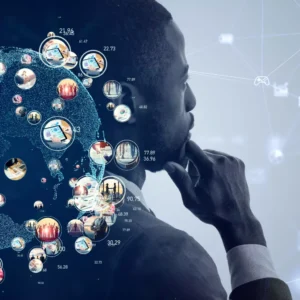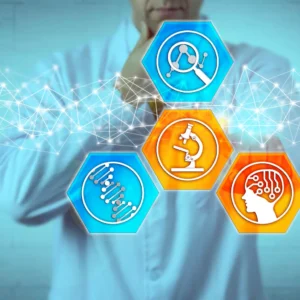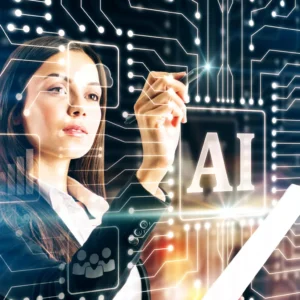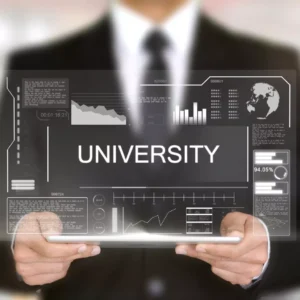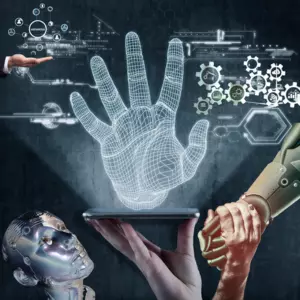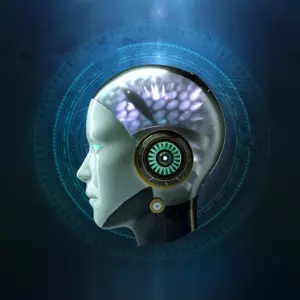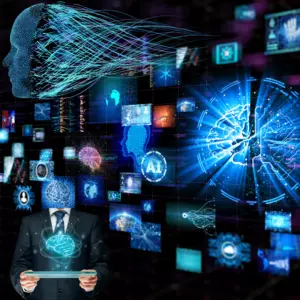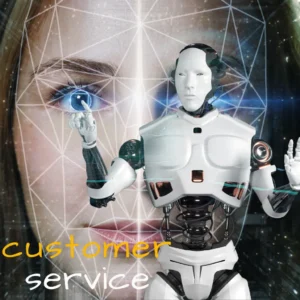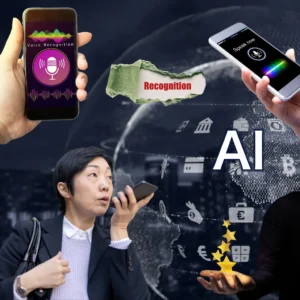
Campus to Computer
AI's Role in Virtual Learning in Higher Education
As higher education adapts to a digital-first world, Artificial Intelligence (AI) plays an increasingly pivotal role in virtual learning environments.
From automating administrative tasks to personalizing learning experiences, AI technologies offer many opportunities to make education more efficient, engaging, and effective.
This article delves into key areas where AI is significantly impacting higher education’s shift from campus to computer.
Table of Contents

Arindam Roy
An Automation Consultant with 25+ years of IT Experience
Crafting Compelling Online Courses: AI in Online Course Creation
Crafting compelling online courses in higher education has reached new heights with the integration of Artificial Intelligence.
AI in online course creation is more than a technological gimmick; it’s a transformative tool that offers personalized learning experiences and dynamic content adaptation. Algorithms analyze students’ learning styles, preferences, and performance metrics to generate tailored coursework, enhancing engagement and comprehension.
As a result, educators can focus on creating rich, interactive materials that are not one-size-fits-all but evolve according to individual student needs. The outcome is a more targeted, effective, and engaging learning experience that elevates the quality of online education.
Advanced Assessment Techniques: Machine Learning in Student Assessment
Machine learning in student assessment is revolutionizing how higher education institutions evaluate academic performance and skill mastery. Traditional testing methods often need to capture the nuances of individual learning journeys.
However, machine learning algorithms can analyze a wide range of data—from test responses to time spent on specific questions—to offer a more holistic view of a student’s abilities and areas for improvement. This advanced assessment technique allows for real-time feedback, enabling educators to intervene immediately and offer targeted support.
The result is a more fair, nuanced, and comprehensive assessment system that better serves educators and students in the digital age.
The Rise of Intelligent Virtual Classrooms: AI-Driven Virtual Classrooms
The classroom concept is profoundly transforming thanks to AI-driven virtual classrooms in higher education. These intelligent platforms utilize facial and voice recognition features to gauge real-time student engagement and participation levels.
With the help of AI algorithms, educators can customize their teaching methods to cater to varied learning styles, offering interactive quizzes, polls, and gamified elements to keep students engaged.
Features such as automated transcription and real-time translation break down accessibility barriers, making education more inclusive. This evolution towards intelligent virtual classrooms is not merely a stopgap solution for remote learning but a long-term strategy to enrich educational experiences.
Predicting and Fostering Student Success: Predictive Analytics for Student Success
Predictive analytics for student success is a groundbreaking application of AI in higher education that aims to identify students at risk of academic failure or dropout before the event occurs.
By analyzing a myriad of data points—such as attendance, grades, and even social engagement—machine learning algorithms can predict patterns that might lead to lower academic performance. This enables educators and administrators to proactively offer resources, counselling, or remedial courses to those in need.
Beyond academics, predictive analytics can also forecast career success, helping institutions tailor programs to meet the future needs of the job market. The goal is not just reactive problem-solving but proactive student success.
Immersive VR Campus Experiences: Virtual Reality (VR) Campus Tours with AI
The era of static, brochure-like campus tours is evolving into an immersive experience with the integration of Virtual Reality (VR) and AI technologies.
VR campus tours powered by AI offer prospective students a vivid, interactive glimpse into campus life from anywhere in the world. As users navigate virtual campus environments, AI algorithms track their interactions and queries to provide real-time, personalized information, such as details about specific academic programs or extracurricular activities.
These tours can also be adaptive, altering the route or focus based on user behaviour and preferences. The result is a profoundly engaging and customized experience that digitally brings the campus to life.
Tailoring Course Content to Individual Needs: AI in Online Course Personalization
One of the most impactful uses of AI in higher education is personalizing online course content. Traditional educational models often offer a static, one-size-fits-all approach that doesn’t cater to individual learning styles or paces.
AI algorithms, however, can analyze student performance, engagement levels, and even preferred learning mediums to adapt course materials dynamically. For example, if a student excels in interactive quizzes but struggles with video lectures, the AI system could offer more text-based resources or gamified challenges tailored to that student’s strengths.
This level of customization makes learning more engaging and effective, allowing each student to realize their full academic potential.
Immediate Support Via AI Chatbots: Chatbots for Student Queries
In today’s digital-first education landscape, immediate support is crucial for student satisfaction and success. AI chatbots serve as an invaluable resource for answering student queries around the clock, eliminating the need for traditional office hours or lengthy email exchanges.
Whether it’s clarifying course material, assisting with enrollment processes, or offering tech support, these chatbots can handle a broad spectrum of questions with instant, accurate responses. Chatbots can improve their problem-solving skills and understanding through machine learning algorithms based on past interactions.
This immediate, AI-enhanced support system streamlines administrative tasks and significantly enriches the student experience.
Pushing Academic Research Boundaries with AI: AI-Enhanced Research in Higher Education
AI-enhanced research is revolutionizing the academic landscape in higher education, offering unprecedented tools for data analysis, hypothesis testing, and even automated experimentation.
By leveraging machine learning algorithms and complex simulations, researchers can sift through massive datasets in record time, uncovering insights that would take human analysts years to identify. AI can also assist in interdisciplinary research, finding connections between genomics and climate science.
The result is a faster, more efficient research process that pushes the boundaries of academic inquiry. As AI continues to evolve, its role in facilitating groundbreaking research in higher education becomes increasingly indispensable.
The Ongoing Digital Shift in Higher Ed: Higher Education Digital Transformation with AI
The digital transformation in higher education is an ongoing journey, accelerated by integrating Artificial Intelligence technologies.
From automating administrative tasks to creating intelligent tutoring systems, AI streamlines operations and enriches academic experiences. This shift is not limited to just virtual classrooms or AI-powered research; it also encompasses smart campus initiatives, predictive maintenance of university facilities, and advanced security measures.
By harnessing the power of machine learning, data analytics, and AI-driven tools, higher education institutions are better equipped to adapt to changing educational landscapes. These technologies are setting new standards for what is possible in education, promising a more flexible, responsive, and personalized learning environment.
Imagining the Future University Experience: The Future of AI in University Learning
As we look toward the future of higher education, it’s evident that AI will play a pivotal role in shaping the university experience. The classrooms of tomorrow could be global hubs of interconnected, AI-driven virtual spaces where geographical location is irrelevant.
Advanced machine learning algorithms could curate personalized academic paths for each student, from course selection to career planning. We might see AI-driven labs where algorithms assist in complex research or AI mentors offering personalized literary and well-being advice.
As data privacy issues and ethical considerations are addressed, the intelligent campus could become the new norm for university learning, delivering efficiency, inclusivity, and personalization.
Conclusion
In conclusion, Artificial Intelligence is not merely a technological add-on but a transformative force redefining the essence of higher education. From crafting personalized courses to pioneering new research avenues, AI makes education more dynamic, inclusive, and effective.
As institutions continue to adapt and evolve, the question isn’t whether AI will be integral to the future of higher education but how profoundly it will change our approach to teaching, learning, and research. So, the leading query remains: Are we ready to fully embrace the possibilities and responsibilities of AI-driven education?
Related Articles
- Beyond Books: AI in Shaping Modern Curricula
- AI in Educational RND: Pioneering Paths
- Tailored Teachings: AI in Support Need Education
- Smart Schools: AI in Educational Management
- Intelligent Intake: AI in College Admissions
- Never Stop Learning: AI’s Boost in Adult Education
- Digital Desks: AI’s Footprint in Modern Classrooms
- Virtual Varsity: AI in E-Learning Platforms
- Reimagining Rules: AI’s Influence on Education Policy
- Smart Choices: AI in Global Education Counselling
- AI in language learning apps: Chatbots to Culture
- AI-Driven Tutoring Platforms: 24/7 Tutors
- Play to Learn: AI Transforming Educational Games
- Scoring with Systems: AI in Exam Prep
- Tiny Tots, Big Tech: AI’s Role in Preschool Education
- Classroom Companions: AI Tools for K-12 Education
- AI-driven EdTech Solutions: Revolutionizing EdTech Investment and Engagement
- Learning Never Stops: AI’s Impact on Continuous Education
- Skill & Scale: AI in Vocational and Technical Training
- Digital Transformation in Education: 5 Areas Where Process Automation Takes the Lead
- Other Articles on AI Usage in Education
- Other Articles on AI usage in other industries

